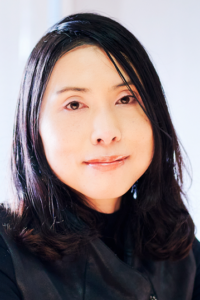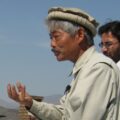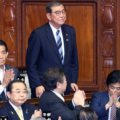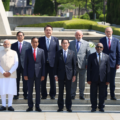America’s Retreat from the Role of “Leader of the Free World” and the Future of Japanese Diplomacy
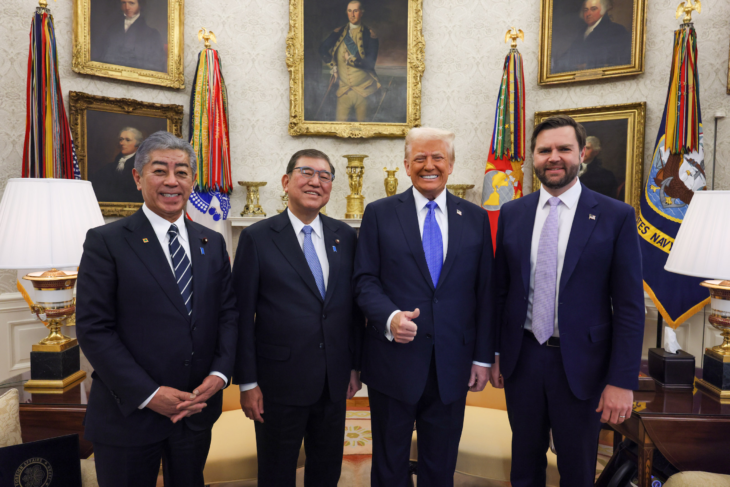
“‘Isolationism,’ which advocates staying out of foreign conflicts unless they directly affect US security or national interests
and instead focusing on domestic issues, is increasingly shared not only by President Trump but also by the next
generation of people in charge of US policy and is becoming a major trend in US diplomacy.”
The Japan-US Summit was held at the White House on February 7 (February 8, Japan time). Pictured are (from left)
Foreign Minister Iwaya Takeshi, Prime Minister Ishiba Shigeru, President Donald Trump, and Vice President J.D. Vance.
Photo: Cabinet Public Affairs Office
Mimaki Seiko, Associate Professor, Doshisha University
On January 20, 2025, the inauguration ceremony of the 47th President, Donald Trump, kicked off the second term of the Trump administration. President Trump’s inaugural address was full of suggestions for what the future of the United States and the world will look like.
At the beginning of his inaugural address, President Trump stated, “the golden age of America begins right now,” and emphasized, “we will not allow ourselves to be taken advantage of any longer.” The implication is this. Previous American presidents have been too good-natured, and have been led astray by other countries praising the United States with words such as “the leader of the international order.” These presidents have invested huge amounts of money and resources to protect the safety and prosperity of other countries, even at the expense of their own national interests. Such good-natured and self-sacrificing behavior should be stopped immediately. Based on this recognition, President Trump proclaimed in his speech that from now on, “I will, very simply, put America first.” True to his word, on his first day in office, he signed an executive order to withdraw the United States from the Paris Agreement to combat climate change, and from the World Health Organization (WHO), which had promoted international cooperation in the development and distribution of vaccines during the spread of COVID-19.
Will the United States in the Trump era curtail its interventions abroad and its involvement in international organizations, and will it stay indoors? Not necessarily. In his inaugural address, President Trump emphasized that “we’re taking [it] back” the Panama Canal, whose management rights were transferred from the US to Panama in 1999. The Panama Canal was built in the early 20th century when the United States forced Panama to become independent and gained control of the Canal Zone. Since the 1960s, as the restitution movement grew in Panama, it was former Democratic President Jimmy Carter who signed a treaty in 1977 to return the canal in its entirety to Panama at the end of the century. Underlying Carter’s decision was the belief that the US could enhance its international standing and advance its national interests not by pursuing its own narrow interests alone or by wielding immense power, but by acting generously and with full regard for the interests of other nations.
In his inaugural address, President Trump criticized Carter’s decision at the time as a “foolish gift,” and in his March 4 State of the Union address, he reiterated that “my administration will be reclaiming the Panama Canal, and we’ve already started doing it.” President Trump has also claimed ownership of Greenland, an autonomous territory of Denmark, saying, “We need Greenland for national security and even international security,” and has also shown a willingness to use military and economic pressure.
Based on these statements, President Trump’s basic worldview is that of the 19th century, when invasion and territorial annexation were not prohibited by international law. His inaugural address included the concept of “manifest destiny,” and he also proclaimed that [America, a growing nation] “expands our territory.” “Manifest destiny,” a term often said to have been coined by journalist John O’Sullivan (1813–1895) in 1845, was the belief that American settlers were manifestly (obviously) destined to expand westward across North America. This idea supported America’s territorial expansion and imperialist advance at the turn of the 19th and 20th centuries.
Will Trump ever change the course of his foreign policy, and will the United States ever again act as the “leader of the free world” that plays a role in the stability of the international order? There may be a short-term correction. However, in the long term, both the world and Japan need to assume an international order without the “leader of the free world” that is America, and proceed with preparations for it.
Since its founding, the United States had adopted an “isolationist” policy of not intervening in wars in Europe, and such a policy of non-intervention had ensured America’s security. This “isolationist” diplomatic policy was abandoned during the two world wars that broke out in Europe in the 20th century, and the US of today was born, with a wide range of roles to play in global security, based on the recognition that American security and global security are inseparable.
On the other hand, this also means that “internationalist America” intervening in global security has a history of only about 80 years. Given the long period of isolationism since the founding of the country, it can be said that the modern era, in which foreign intervention has become the norm without regard to the exhaustion of the people, is what is “abnormal.” Trump’s diplomacy, which turns its back on global conflicts and seeks to reduce foreign involvement, can also be seen as an attempt to return to the “normal” of “isolationism.”
More remarkably, Vice President J.D. Vance, who is already seen as a leading contender for the Republican Party’s next presidential nomination, has expressed an even more reluctant attitude toward foreign entanglements than President Trump. “Isolationism,” which advocates staying out of foreign conflicts unless they directly affect US security or national interests and instead focusing on domestic issues, is increasingly shared not only by President Trump but also by the next generation of people in charge of US policy and is becoming a major trend in US diplomacy.
This poses a major challenge for Japan, which has touted its “shared values” with the United States. In early April 2024, then-Prime Minister Kishida Fumio visited the United States and held a summit meeting with then-President Joe Biden, where it was announced that the two countries agreed that “Japan and the US have become global partners beyond bilateral or regional spheres, to uphold and bolster the free and open international order based on the rule of law.” In addition, Prime Minister Kishida delivered a speech at a Joint Meeting of the United States Congress entitled “For the Future: Our Global Partnership,” in which he proclaimed that “the world looks to your leadership” and that “On the spaceship called ‘Freedom and Democracy,’ Japan is proud to be your shipmate.” By contrast, the United States-Japan Joint Leaders’ Statement issued after the first Japan-US Summit Meeting between Prime Minister Ishiba Shigeru and President Trump in early February 2025 did not include words like “rule of law” or “international order.”
Will the Japan-US alliance in the future cease to be an “alliance of values” bound by common values such as “rule of law” and “international order”? That would be a great loss to world peace. Japan should continue to uphold the expectations and hopes for American leadership expressed by Prime Minister Kishida and continue to urge the United States to play a leading role in defending the rules-based international order, while being realistic about the rupture in values between the two nations that was revealed at the Trump-Ishiba summit.
Translated from an original article in Japanese written for Discuss Japan. [March 2025]
Keywords
- Mimaki Seiko
- Graduate School of Global Studies
- Doshisha University
- international order
- United States
- leader of the free world
- internationalist
- interventionist
- Trump administration
- isolationism
- Panama Canal
- Greenland
- manifest destiny
- global partnership
- Kishida Fumio
- Ishiba
- rule of law
- common values
